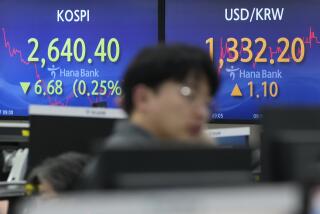Analysts Paint Earnings Picture Far Too Rosy
Disneyland is cutting ticket prices for the first time in its history, General Motors could report a stunning $1.4-billion fourth-quarter loss and retail sales at Christmas were the worst since 1982.
But fourth-quarter corporate profits will still come in higher than a year earlier, and that will support stock prices.
Hmmmm . . . what’s wrong with this picture?
Wall Street analysts, who almost always are too optimistic about the prospects of the companies they follow, continue to see healthy earnings gains for many firms in the fourth quarter--despite the economy’s rapid descent.
To some Wall Streeters, the gap between forecasts and reality looks dangerously wide and raises the risk of a severe slam to stocks as 1990 corporate earnings reports are announced during the next few weeks. “I think earnings are going to be far worse than analysts are expecting,” says Suresh Bhirud, investment policy chief at Dean Witter Reynolds in New York.
One brokerage strategist put it even more bluntly: “I think people are crazy,” he said, requesting anonymity for fear of offending some of his own senior analysts.
Zacks Investment Research in Chicago, which tracks analyst earnings forecasts, says its tally now shows that analysts expect a 4% average rise in fourth-quarter earnings for the Standard & Poor’s 500 major companies versus a year earlier.
To their credit, analysts have cut their estimates in recent weeks. “The average expected gain was 10% a couple of months ago,” says Ben Zacks, the research firm’s chief. Still, there is increasing concern that estimates haven’t been cut nearly enough.
One reason analysts see better numbers is that earnings in 1989’s fourth quarter were sharply depressed by restructuring writeoffs. S&P; 500 earnings in the fourth quarter of 1989 were the lowest since the final quarter of 1987. So many firms will simply have easier comparisons in the latest quarter--in theory, anyway.
But considering how dramatically the economy declined in the final months of 1990, Morgan Stanley & Co. investment strategist Byron Wien predicts that “the fourth quarter is going to be the most difficult quarter in this (economic) cycle” for analysts to guess earnings. Historically, he notes, analysts have a terrible time accurately projecting earnings when sales are sliding.
Some investors may wonder whether the fourth-quarter numbers will matter at all. Everyone knows we’re in a recession. Everyone knows business is bad, especially for industrial companies. Even if profits come in worse than expected, will investors care--especially with a Mideast war looming? “My clients are focused more on 1991 than 1990,” Wien admits. “Everybody’s just happy to have 1990 behind them.”
Yet investors didn’t yawn at news reports of GM’s expected loss. The stock has fallen 8% so far this year to $31.75 on Tuesday. Railroad giant Burlington Northern lost 75 cents to $28 on Tuesday after the company warned that fourth-quarter earnings won’t meet expectations.
Ominously, many analysts say the biggest risk lies in food, drug and other companies allegedly immune to economic downturns. Earnings expectations for those companies are very high: Drug firm Merck is expected to report a 24% earnings gain for the quarter; McDonald’s, beset by slower sales of late, is still seen earning 11% more in the quarter than a year earlier.
“Those groups are where you can really stumble” if earnings don’t match estimates, Zacks warns. Some food companies, including Kellogg and Borden, warned midway through the fourth quarter that profit margins were under pressure because of rising competition. Investors may have forgotten the warnings.
Even if you take the attitude that the fourth quarter is history, year-end profit reports will be crucially important for what they tell us about companies’ 1991 prospects. If the numbers are far worse than expected in the fourth quarter, it may suggest that many companies’ results will be absolutely dismal if Mideast war breaks out and the economy goes deeper into recession.
Salomon Bros. analyst Richard Berner produced a series of reports in 1990 on what he called “the new profit cycle.” His basic conclusion: Higher oil company profits and improved overseas results for U.S. companies will mask an alarming deterioration of domestic corporate earnings in this recession.
Although the overall slide in profits may be about 8% in 1991 from 1990, Berner says, domestic corporate earnings excluding energy companies could drop 20% this year. The culprit, Berner says, is the high level of debt many companies are stuck with from the 1980s.
As the economy contracts for the first time since 1982, the painful lesson for companies and their shareholders will be that “leverage works both ways,” Berner says.
Briefly: Hilton Hotels Corp. stock continues to be supported by unfounded rumors of a Japanese bid for all or part of the company. The stock jumped $2.125 last Thursday as the rumors surfaced again. It closed unchanged at $37 on Tuesday. But if the stock is as much of a bargain as some people believe, how come Hilton itself isn’t buying it? The company last year authorized a buyback of as many as 6 million of its 47 million shares, but a Hilton spokesman says only 100,000 shares were repurchased in the fourth quarter--even as the stock drifted down to $26. “Mr. Hilton (Chairman Barron Hilton) makes the call on the buyback,” the spokesman said. Obviously, Mr. Hilton doesn’t see any reason to rush in at these prices.
HOPE SPRINGS ETERNAL How fourth-quarter earnings per share are expected to come in for 10 major companies in the Dow Jones industrial average.
4th-quarter EPS: Est. Company 1989 ’90 est. change American Express $0.61 $0.50 -18% Bethlehem Steel 0.41 0.17 -59% Boeing 0.23 1.02 +343% Coca-Cola 0.36 0.43 +19% General Electric 1.30 1.42 +9% IBM 3.62 3.98 +10% Merck 0.93 1.15 +24% McDonald’s 0.46 0.51 +11% 3M Co. 1.31 1.41 +8% Procter & Gamble 1.21 1.39 +15% S&P; 500 4.80 5.00 +4%
Source: Zacks Investment Research
More to Read
Inside the business of entertainment
The Wide Shot brings you news, analysis and insights on everything from streaming wars to production — and what it all means for the future.
You may occasionally receive promotional content from the Los Angeles Times.










